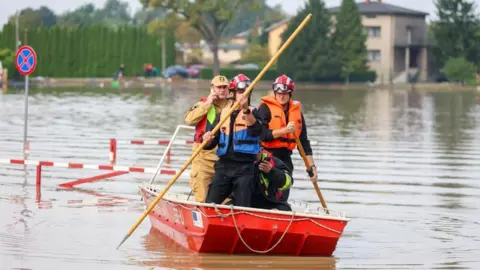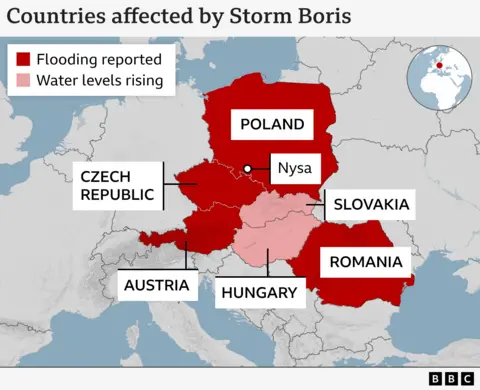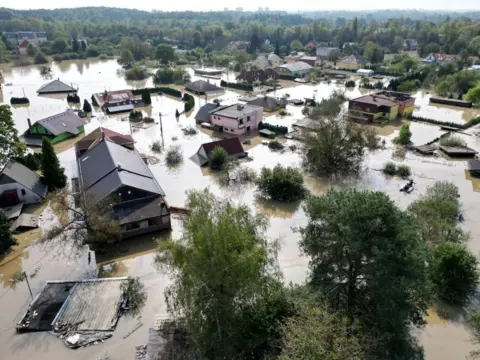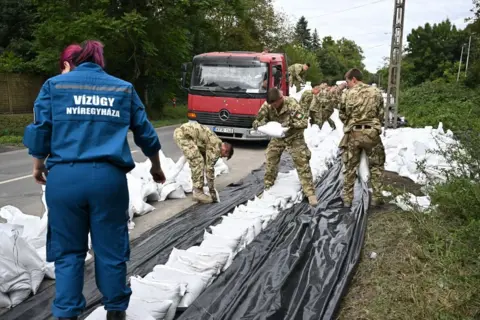ARTICLE AD BOX

 EPA
EPA
Rescuers work at flooded areas in Czechowice-Dziedzice, south Poland
Intense storms battering central Europe are now reaching Italy, where warnings for heavy rain, strong winds and floods have been issued for much of the country.
Floods are already reported in the central city of Pescara, while the Italian meteorological service's weather alerts apply from the northern coast of Emilia-Romagna to the far-south.
The warnings come as flooding has devastated parts of Poland, the Czech Republic, Romania and Austria this week, leaving at least 21 people dead.
Authorities in Croatia, Hungary and Slovakia are also warning of flooding in the coming days.
The significant flooding has been caused by Storm Boris, which brought vast amounts of rain and snow at the weekend.
More than 5,000 soldiers have been deployed to help people in southern Poland, including the 40,000 residents evacuated from the town of Nysa.
The flood waters are receding in some places in the region and spreading in others, with the extent of the damage revealed in places like Glucholazy.
The town's main bridge has collapsed after being damaged by the swollen river, while many of its streets are covered in a thick layer of mud.
Polish police confirmed at least six people have died, cautioning against against “false information” following media reports that have put the total number of people killed at more than a dozen.
The country's prime minister, Donald Tusk, has declared a month-long state of natural disaster - with the worst flooding expected to hit the city of Wroclaw on Wednesday.


Areas along the Czech-Polish border are among the worst-hit, where 15,000 people have been evacuated in Czech Republic as well.
The country has experienced the worst flooding in over 27 years, according to local NGO Člověk v tísn.
Ostrava has been one of the most-affected towns, after the river Oder burst its banks following heavy downpours on Tuesday.
Water levels are continuing to rise fast on the River Danube in Slovakia and Hungary, with the Slovak capital Bratislava and its Hungarian counterpart Budapest preparing for possible flooding.
Emergency services and volunteers, in some places backed up by the army, are also working round the clock to protect low-lying settlements in the region.

 Reuters
Reuters
A drone view of a flood-affected area in Ostrava, Czech Republic
Austrian authorities have closed sections of the Danube to shipping traffic over the elevated water levels along the vital waterway, according to reports in local media.
The Croatian Meteorological and Hydrological Service has warned the river could experience an "extremely rare" water increase - and confirmed plans are in place to put up flood barriers if necessary.
In Italy, the country's National Civil Protection Service has also issued yellow alerts for nearly 50 regions tomorrow, warning there is a risk of storms, landslides and floods.
BBC Weather forecasts are pinpointing the Emilia-Romagna and Marche regions as an area of greatest concern.
The region could see one or two months' worth of rain fall in the next three days alone, and there are major concerns over the prospect of flooding.
Red weather warnings have already been issued by the Italian Air Force Meteorological Service for Wednesday.
Firefighters in Pescara, Abruzzo say they have already received more than 200 calls for help after heavy rainfall triggered flooding.
In Romania, more rain is forecast in the eastern Carpathians, endangering towns and villages in Galati and Vaslui counties, which have already been hard hit.

 Getty Images
Getty Images
Hungarian soldiers the village of Leanyfalu helping erect flood barriers with sand bags
Extreme rainfall is becoming more frequent and more intense across central Europe, as across much of the world.
While events in central Europe fit with expectations of more extreme rainfall in a warming world, it is not yet possible to quantify exactly how much of a role climate change has played.
To know for certain, that requires a full scientific analysis of the natural and human influences - which can take weeks or months.
But climate scientists have been warning for years about extreme rainfall events like these occurring as the planet warms.
A warmer atmosphere holds more moisture, leading to more intense rainfall.
Warmer oceans also lead to more evaporation, feeding storm systems.
For every 1C rise in the global average temperature, the atmosphere is able to hold about 7% more moisture.

 4 months ago
15
4 months ago
15








 English (US) ·
English (US) ·